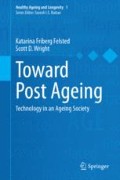Abstract
This raises challenging questions about the role of forgetting and remembering in the lives of older adults and a debate about if both are important—or is one more important to well-being than the other and what role should technology play in supplementing creating autobiographies and enhancing the practice of reminiscence and story-telling? What role will technology play in the interventions for those older adults with cognitive impairments? What are the ethical and legal issues that surround “perfect remembering” due to digital technologies? Perfect remembering—or that lack of forgetting—has interesting implications for research in our field where the cognitive capacity to remember (and function accordingly) and the fear of forgetting loom large in our literature.
Access this chapter
Tax calculation will be finalised at checkout
Purchases are for personal use only
References
Alexander, H. (2009). Reflections on Benjamin button. Philosophy and Literature, 33, 1–17.
Blackmore, S. (2010). The third replicator. New York Times. Retrieved from August 22, 2010, from http://opinionator.blogs.nytimes.com/2010/08/22/the-third-replicator/
Buse, C. E. (2010). E-scaping the ageing body? Computer technologies and embodiment in alter life. Ageing and Society, 30, 987–1009.
Clark, A. (2003). Natural born Cyborgs: Minds, technologies, and the future of human intelligence. New York: Oxford University Press.
Clark, A. (2010). Supersizing the mind: Embodiment, action, and cognitive extension (Philosophy of the mind). New York: Oxford University Press.
Dryden, J. (2014). Vita thesei [Trans.] (22–23). Retrieved from http://classics.mit.edu/Plutarch/theseus.html (see also https://faculty.washington.edu/smcohen/320/theseus.html )
Friedman, R. (2009). Reverse engineering the brain. Biomedical Computation, 5, 10–17.
Garvey, J. (2007). The moral use of technology. Royal Institute of Philosophy Supplement, 82, 241–260.
Hannah, R., & Maiese, M. (2009). Embodied minds in action. New York: Oxford University Press.
Lakoff, G., & Johnson, M. (1999). Philosophy in the flesh: The embodied mind and its challenge to western thought. New York: Basic Books (Perseus Book Groups).
Mayer-Schonberger, V. (2009). Delete: The virtue of forgetting in the digital age. New Jersey: Princeton University Press.
Nejat, G., Nies, M., & Sexton, T. R. (2010). An interdisciplinary team for the design and integration of assistive robots in health care applications. Home Health Care Management and Practice, 22(2), 104–110.
Roden, D. (2010). Deconstruction and excision in philosophical posthumanism. Journal of Evolution and Technology, 21(1), 27–36.
Schneider, S. (2009). Mindscan: Transcending and enhancing the human brain. Retrieved September 8, 2010, from http://www.sas.upenn.edu/~sls/documents/Schneider-Mindscanproofs.pdf
Taylor, T. (2010). The artificial ape: How technology changed the course of human evolution. New York: Palgrave Macmillian.
Author information
Authors and Affiliations
Corresponding author
Rights and permissions
Copyright information
© 2014 Springer International Publishing Switzerland
About this chapter
Cite this chapter
Felsted, K.F., Wright, S.D. (2014). Technology. In: Toward Post Ageing. Healthy Ageing and Longevity, vol 1. Springer, Cham. https://doi.org/10.1007/978-3-319-09051-1_10
Download citation
DOI: https://doi.org/10.1007/978-3-319-09051-1_10
Published:
Publisher Name: Springer, Cham
Print ISBN: 978-3-319-09050-4
Online ISBN: 978-3-319-09051-1
eBook Packages: Biomedical and Life SciencesBiomedical and Life Sciences (R0)

